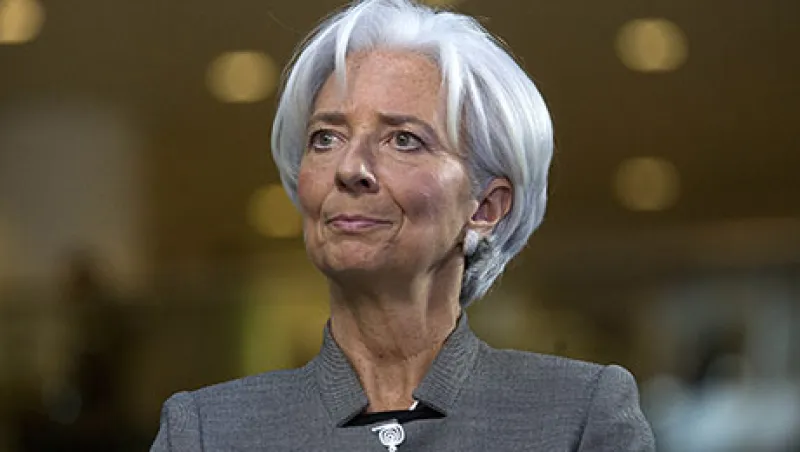The International Monetary Fund issued an unchanged global growth forecast this week, a welcome change for an institution that has been persistently revising its outlooks downward in recent years. Yet there was little feel-good factor as officials from around the world gathered in Washington this week for the spring meetings of the IMF and the World Bank.
The subdued atmosphere stemmed in part from the modest nature of the IMF’s economic projections. It expects the global economy to grow by 3.5 percent this year and 3.8 percent in 2016. That would be up marginally from 3.4 percent in each of the past three years, but still well below the rates of 4 percent to 5 percent that prevailed for much of the previous decade. The global financial crisis still casts a long shadow over the economy, in effect.
“We believe that growth is just simply not good enough,” Christine Lagarde, the IMF managing director, said Thursday at the formal start of the meetings. “Not good enough to reduce high unemployment still, not good enough to grow middle-class incomes, not good enough to drive poverty reduction.”
And as lackluster as the growth outlook is, there are significant risks — an anticipated U.S. rate hike later this year, a potential Greek default and exit from the euro zone, the distorting effects of central bank easing policies, volatile currencies and capital flows — that could derail the economy.
“Risks to the global financial system have increased since October and have rotated to parts of the system where they are harder to assess and harder to address,” cautioned José Viñals, head of the Fund’s Monetary and Capital Markets Department. The big risks have shifted “from banks to nonbanks, from solvency to liquidity risks and from advanced economies to emerging markets,” he added.
Among the big risks preoccupying policymakers was the prospect that the Federal Reserve Board will begin raising interest rates later this year. When, and by how much, will determine how large the ripples will be in global capital markets.
Although careful not to make a prediction, the Fund suggested that markets could experience a shock on a par with the so-called taper tantrum of mid-2013, when the mere hint that the Fed would start winding down its quantitative easing program sent markets into a tailspin. “This risk is not currently a major focus for market participants,” the IMF stated in its semiannual Global Financial Stability Report. However, “as was seen in May–June 2013, a sudden rise of 100 basis points in the 10-year Treasury yield is quite conceivable, even in a generally disinflationary context and even when central banks work to communicate their intentions in advance.”
Such a move could spell big losses for investors who have helped drive down yields on government bonds to unprecedented lows and moved into riskier parts of the credit markets in a search for yield. Yields on ten-year government bonds are lower today than a year ago, standing at around 1.89 percent for U.S. Treasuries, a mere 8 basis points for German Bunds and –17 basis points for Swiss bonds.
“The greater risk taking involved in chasing disappearing yield has pushed term premiums deep into negative territory,” Hyun Song Shin, head of research at the Bank for International Settlements, told an economic conference held on the sidelines of the meeting. “The lower the term premium goes negative, I think we can be sure the higher it goes positive on the rebound.”
Risks and the growth outlook are closely intertwined, of course. Although the IMF maintained an unchanged global forecast in its World Economic Outlook, published this week, it lowered its forecast for U.S. growth this year to 3.1 percent, down by a half percentage point from January, while raising its forecast for growth in the euro area by 0.3 point, to 1.5 percent, and by 0.4 point for Japan, to 1 percent. In short, the Fund says QE by the European Central Bank and the Bank of Japan is working, weakening the euro and yen and shifting growth from the U.S. to Europe and Japan. Weaker than expected data on U.S. industrial production and retail sales this week told a similar story.
Fund officials believe the shift is positive on balance, giving much-needed momentum to the European and Japanese economies while not threatening the U.S., where it believes the recovery has momentum. “We think here that the U.S. has more margin of adjustment in terms of policies and therefore can offset most of the effects of an appreciation,” said the IMF’s chief economist, Olivier Blanchard.
Greece is the other big uncertainty. Tensions remain high between the Syriza government in Athens and its European Union partners, casting doubt on the prospects of reaching an agreement that would free up fresh funds and enable the Greek government to make key debt repayments that are due in coming weeks.
Lagarde took a firm line to scotch any idea that the Fund might give Greece an extension on a €747 million ($804.2 million) repayment due next month, which Athens has reportedly been seeking. The Fund has not allowed any borrowers to delay payments in the past 30 years, she said, adding, “It’s clearly not a course of action that could actually fit or be recommendable.”
IMF and EU officials seem determined to play hardball with Athens, insisting that a Greek exit from the euro zone would be manageable because the euro area economy and financial system have been strengthened over the past two or three years. Asked about the potential impact of a Grexit, Blanchard said, “It will not be smooth sailing, but it could probably be done.”
A senior EU official, who spoke on condition of anonymity, said the risks of contagion to the rest of the euro zone were “minimal.” But, he acknowledged, a Grexit would be a leap into the dark, much like the U.S. decision to let Lehman Brothers Holdings go bust back in 2008. “We don’t have any experience with this,” he said.
Most meeting participants were hoping he’d be able to say the same thing in a month’s time.
Follow Tom Buerkle on Twitter at @tombuerkle.






